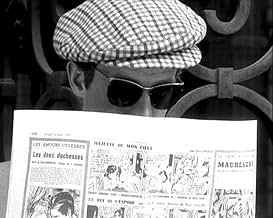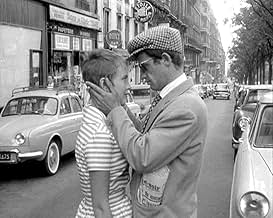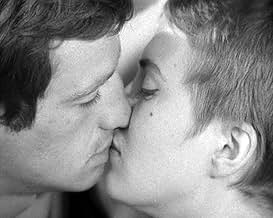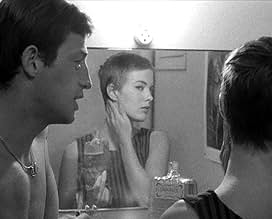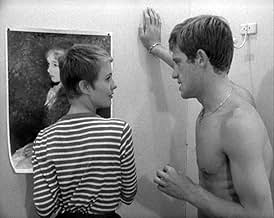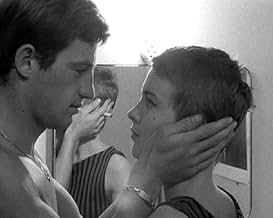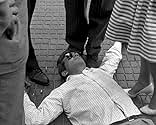Un ladrón de poca monta roba un coche y asesina de manera impulsiva a un motorista de la policía. Buscado por las autoridades, se reúne con una estudiante estadounidense de periodismo y trat... Leer todoUn ladrón de poca monta roba un coche y asesina de manera impulsiva a un motorista de la policía. Buscado por las autoridades, se reúne con una estudiante estadounidense de periodismo y trata de convencerla para que huya con él a Italia.Un ladrón de poca monta roba un coche y asesina de manera impulsiva a un motorista de la policía. Buscado por las autoridades, se reúne con una estudiante estadounidense de periodismo y trata de convencerla para que huya con él a Italia.
- Dirección
- Guión
- Reparto principal
- Nominado a 1 premio BAFTA
- 5 premios y 4 nominaciones en total
- Michel Poiccard a.k.a. Laszlo Kovacs
- (sin acreditar)
- Patricia Franchini
- (sin acreditar)
- Tolmatchoff
- (sin acreditar)
- Police Inspector Vital
- (sin acreditar)
- Photographer
- (sin acreditar)
- A Journalist
- (sin acreditar)
- Man in a White Car
- (sin acreditar)
- A Drunk
- (sin acreditar)
- A Journalist
- (sin acreditar)
- Liliane
- (sin acreditar)
- …
- Police Inspector #2
- (sin acreditar)
- The Snitch
- (sin acreditar)
- Carl Zubart
- (sin acreditar)
- Antonio Berrutti
- (sin acreditar)
- A Journalist
- (sin acreditar)
- Journalist at Orly
- (sin acreditar)
Reseñas destacadas
I'm only stating this because around a year and a half ago, I began my sporadic voyage into the depths of Godard with his most recent picture, at the time, Film Socialisme, which I found to be an assault on every conceivable sense and not in a particularly good way. The film was choppy, disjointed, messy, just about as incomprehensible as it could be, and trying to find justifications or analyses online proved ineffective. All and all, it's a film I just want to forget and I didn't care to dive into Godard much after that endeavor. I now realize that a decent part of the blame is on me for choosing perhaps the wrong film to begin my Godardian journey with. I emerge from seeing Breathless (known by its French title as À bout de soufflé) with a more of a positive reaction. This is a bravely-structured and maturely handled annihilation to every cinematic convention prior to its 1960 release down with class and impenetrable style on part of Godard.
The story - even though it is relatively the least of our concerns - follows Michel (Jean-Paul Belmondo), who is trying to emulate the characteristics possessed by Humphrey Bogart during the particular 40s/50s era of menacing American crime dramas that billed him as the lead actor. One day, feeling intimidated and a perhaps a little adventurous, Michel shoots a police officer who has been tailing him and now must deal with being broke and on the run from the cops. His only companion is Patricia (Jean Seberg), an American journalist getting by in life by selling newspapers in downtown Paris. The two desperately skim through their options trying to hide from the police, one of which is skipping town and going all the way to Italy as fugitives.
I say the story is the least of our concerns because there is simply not much to it. After all, Breathless is an aesthetic breakthrough rather than a narrative one. Godard employs dangerously subversive jump cuts - where the camera cuts to another shot within the same frame creating a breach in continuity - along with rapid-fire, quick shots and lengthy dialog scenes. All of this broke French cinema convention, which, prior to this, was consistently polished and very elegant. Godard invited in a rebellious messiness to the picture, almost like the guy coming into a neatly-organized room and rustling all the papers and files to not only create a stir but to do something different, something completely new.
It's almost shortchanging to simply say that I have immense respect for Godard seeing as in 1960, a time when social change and civil unrest amongst adolescents and twentysomethings seemed to be so prevalent in many different places, he ushered in a new way of doing things cinematically and created a stylistically bold film because of it. He even threw in the element of using a hand-held camera, an unheard of practice during this particular time. I think I would also be in line to compare Breathless to Bonnie and Clyde, a film that would enter the picture seven years later in American studios that would simultaneous shock and stimulate audiences everywhere.
Godard's films have a unique power after you watch them. For example, it has been about four days since I sat down to watch Breathless and since watching it - and now writing a medium-length analysis of it - I have a strong, biting urge to watch more of Godard's films. His films have the kind of impact where you just want to talk about them and talk about their impact in great length; which, once more, brings me to the point that watching the films is actually the weaker part compared to discussing them.
Starring: Jean-Paul Belmondo and Jean Seberg. Directed by: Jean-Luc Godard.
Still a wonderful introduction to the world of French cinema of the time, but needs to be taken in context as familiarity breeds contempt and this was, after all, part of the foundations and a cornerstone of so much of what was to come. Imaginatively and innovatively directed by one of the greatest, with two flowers of the 60s revealing their early petals, and after smoking so many cigarettes, is it any wonder you'd struggle to catch your breath!
The most important thing this film is remembered for is it's general disregard for the so called "rules" of filmmaking. It boasts groundbreaking cinematography, introducing the "Jump Cut" to make the film's pacing more kinetic. The other most notable aspect of this film is its dialogue: natural, yet almost poetic in its delivery.
The two leads are very charming, especially Belmondo's Michel. His suave demeanor and charismatic presence steals whatever scene he's in. Jean Seberg's turn as Patricia is more subtle and nuanced, making her role the more complex of the two, even if it's not as entertaining as Belmondo's performance.
As I have stated earlier, this is not a film that is concerned with plot as much as it is feel. Director Jean-Luc Goddard was trying to do something new for the cinema world, and succeeded in doing so. "Breathless" is a must see for any cinephile due to its long term impact on film as a medium.
8.5/10.
With his knowledge of classic film narrative and style Godard went out to create his own film in homage to, and also complete contradiction to, classic Hollywood film.
The plot reads almost like a crime thriller typical of the 1930-40's. A criminal on the run from the police; the distraction of a beautiful woman; the escape and eventually someones death. But it is in Godard's approach to film style and use of new technologies that the typical crime thriller was turned on its head.
In a break from classic Hollywood narrative the film opens with little equilibrium. Our protagonist's motives are unclear as he tears off to Paris leaving a woman and a dead cop in his trail. This in turn makes the ending somewhat open ended. With no sense of equilibrium to start with how can there be closure on what has happened throughout the film.
Another twist on the classic storytelling in film is the progression of plot. It is naturally assumed in classic Hollywood film, that everything the spectator sees they see for a reason. With Michel's constantly pointless phone calls to retrieve owed money the plot is not pushed along at all. The inclusion of a 25 minute digression from the plot stands to emphasise the spectators reliance on narrative structure in the watching of films. Although watching the film closely is, as always, important in following the story A Bout de Souffle requires that little bit extra to define where the plot is being progressed and where Michel or Patricia are just flattering their egos or each other.
All in all I personally think that A Bout de Souffle brought about a sense of realism not seen in Hollywood cinema before 1959 and even now. The fact that life isn't full of clues that will help us progress in say our relationships or escape from authority, but is infact full of digression; self exploration; and the confusions of love, ego and aspirations.
¿Sabías que...?
- CuriosidadesDespite reports to the contrary, Jean-Luc Godard did not shoot the film without a script; however, he did not have a finished script at the beginning, instead writing scenes in the morning and filming them that day. See also Pierrot, el loco (1965).
- PifiasDuring street shots, countless passersby look at Patricia and Michel and stare into the camera, revealing that the shots were made without filming barriers and simply used street pedestrians in place of extras.
- Citas
Patricia Franchini: What is your greatest ambition in life?
Parvulesco: To become immortal... and then die.
- ConexionesEdited into Pariz pripada nama! (2016)
Selecciones populares
Detalles
- Fecha de lanzamiento
- País de origen
- Idiomas
- Títulos en diferentes países
- Al final de l'escapada
- Localizaciones del rodaje
- 11 rue Campagne Première, Paris 14, París, Francia(on location)
- Empresas productoras
- Ver más compañías en los créditos en IMDbPro
Taquilla
- Presupuesto
- 400.000 FRF (estimación)
- Recaudación en Estados Unidos y Canadá
- 414.173 US$
- Fin de semana de estreno en EE. UU. y Canadá
- 32.424 US$
- 30 may 2010
- Recaudación en todo el mundo
- 596.100 US$
- Duración1 hora 30 minutos
- Color
- Mezcla de sonido
- Relación de aspecto
- 1.37 : 1





